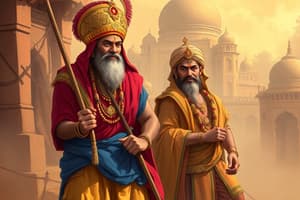Podcast
Questions and Answers
What did Quaid-e-Azan Muhammad Ali Jinnah propose in the Conference?
What did Quaid-e-Azan Muhammad Ali Jinnah propose in the Conference?
- To boycott the Congress completely
- To demand separate electorates for Muslims regardless of Congress' decision
- To ask for a separate Muslim majority province
- To give up the demand for separate electorates if Congress agreed to protect Muslim rights (correct)
What was one of the proposals given by Quaid-e-Azan Muhammad Ali Jinnah at the Conference?
What was one of the proposals given by Quaid-e-Azan Muhammad Ali Jinnah at the Conference?
- Introduction of reforms in the Central Province
- Sindh to be separated from Bombay and made a separate province (correct)
- Separation of Balochistan from British India
- To ensure one-third representation in the central legislature for Hindus
Why did the Congress decide to boycott the Simon Commission?
Why did the Congress decide to boycott the Simon Commission?
- Because it had no Indian member on the Commission (correct)
- Because it wanted to include India in British Parliament
- Because it agreed with all of Muslim League's demands
- Because it recommended separate electorates for Muslims
Which group within the All-India Muslim League wanted to cooperate with the Simon Commission?
Which group within the All-India Muslim League wanted to cooperate with the Simon Commission?
What was the purpose of sending the Simon Commission to British India?
What was the purpose of sending the Simon Commission to British India?
How did Hindu minorities in Muslim majority provinces benefit according to Quaid-e-Azan Muhammad Ali Jinnah's proposal?
How did Hindu minorities in Muslim majority provinces benefit according to Quaid-e-Azan Muhammad Ali Jinnah's proposal?
What did Quaid-e-Azan Muhammad Ali Jinnah suggest about one-third representation in the central legislature?
What did Quaid-e-Azan Muhammad Ali Jinnah suggest about one-third representation in the central legislature?
What was the response of Congress to Quaid-e-Azan Muhammad Ali Jinnah's proposal on joint electorates?
What was the response of Congress to Quaid-e-Azan Muhammad Ali Jinnah's proposal on joint electorates?
Why did Quaid-e-Azan Muhammad Ali Jinnah and a large group of Muslim leaders boycott the Simon Commission?
Why did Quaid-e-Azan Muhammad Ali Jinnah and a large group of Muslim leaders boycott the Simon Commission?
Why did some members within All-India Muslim League want to cooperate with Simon Commission?
Why did some members within All-India Muslim League want to cooperate with Simon Commission?
Flashcards are hidden until you start studying
Study Notes
Political Awakening in India
- The struggle for political rights and representation gained momentum in India post-World War II, with the Muslim community increasingly seeking separation from Hindu-centric policies.
- After the War of Independence in 1857, Indian Muslims felt isolated and recognized that their interests were not being safeguarded by the Hindus, contributing to a collective political consciousness.
- The first major organized protest against British goods was initiated by Shah Mehta, highlighting the tensions that led to the eventual partition of India.
- The Liberal Bill of 1884 passed by Lord Ripon, aimed at benefiting Muslims through education and job opportunities, ultimately spurred political disturbances when the partition of Bengal was reversed in 1911, consolidating Hindu political dominance.
Formation of the Muslim League
- The All-India Muslim League was established in December 1906 in Dacca (Dhaka) under Nawab Salimullah to safeguard Muslim interests and political rights.
- Significant demands included a separate electorate for Muslims at all governance levels, which was granted through the Minto-Morley Reforms.
- Muslim leaders recognized the Indian National Congress as primarily representing Hindu interests, which fueled discontent and the need for a dedicated Muslim political party.
Khilafat Movement (1919)
- The Khilafat Movement, led by the Ali Brothers, sought to protect the Ottoman Caliphate after World War I, central to Muslim unity.
- It advocated for the fair treatment of Turkey, emphasizing that protecting the Caliphate was a duty of every Muslim.
- The movement gained considerable support in British India but collapsed when the Caliphate was abolished in 1924, leading to the exile of Khalifa Abdul Majid II.
- Mustafa Kemal Pasha emerged as a reformist leader, establishing a nationalistic agenda in Turkey that ultimately severed ties with the traditional Caliphate.
Political Reforms and Rejections
- Diarchy introduced a divide where certain powers remained with the British-appointed governors while others were transferred to local councils, viewed as inadequate by both the Muslim League and Congress.
- Separate electorates for Hindus and Muslims were established, yet these reforms gave limited power with most authority retained by the British Viceroy.
- The persistent calls for political autonomy and representation reflected the growing discontent among Indian Muslims and the need for a political entity that could address their interests.
Studying That Suits You
Use AI to generate personalized quizzes and flashcards to suit your learning preferences.



